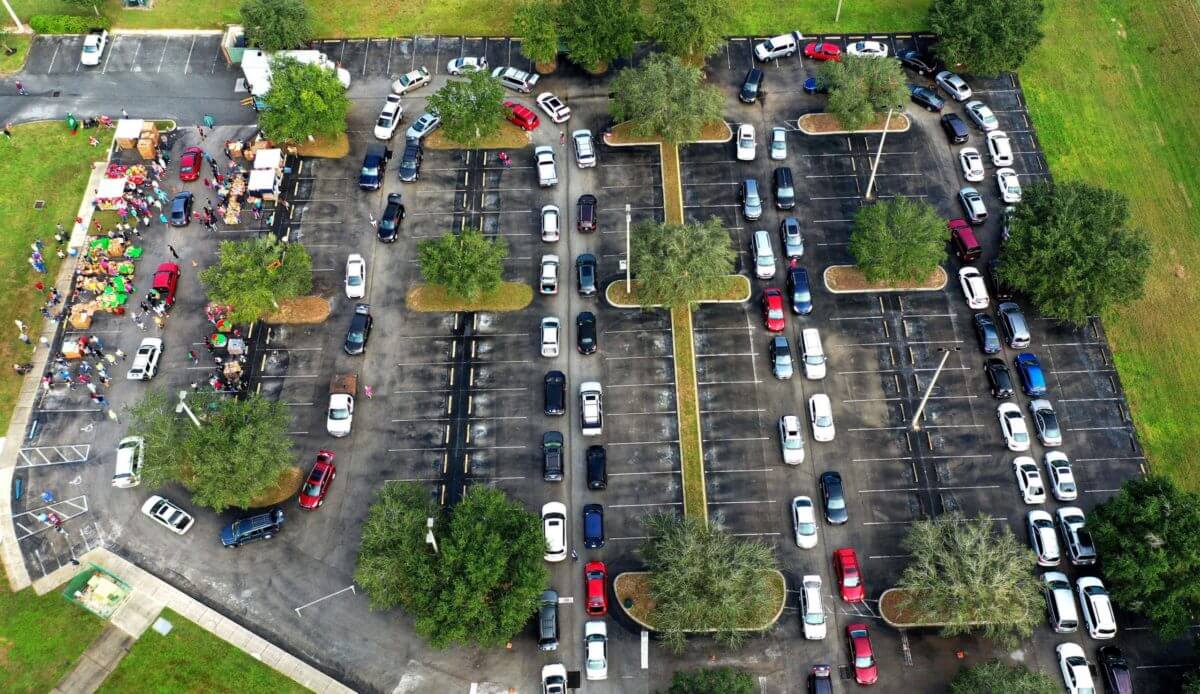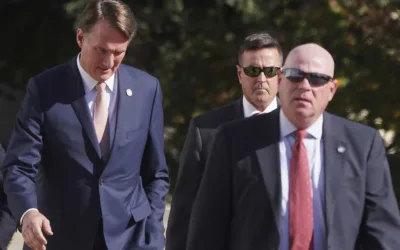
Food insecurity—already approaching record levels across the United States—could get even worse if federal programs lapse at the end of December. This line of cars was seen in Florida last week. (Photo by Paul Hennessy/SOPA Images/LightRocket via Getty Images)
Millions of Americans are facing a financial cliff on New Year’s Day if Republicans refuse to pass another round of COVID-19 relief.
For months, lawmakers on Capitol Hill have struggled to reach an agreement on the next round of coronavirus relief for American residents, small businesses, and states. The House of Representatives passed the HEROES Act in May, which would provide substantial relief to individuals and businesses. However, the legislation has idled in the GOP-controlled Senate since then, as talks between the White House and Democrats in the House also have yet to yield a compromise.
A lapse in any one of the relief programs below could prove devastating for large swaths of the American population. However, expiring protections across four major major financial safety nets at the same time could set the economy in freefall.
If the government does nothing by Dec. 31, Americans will lose protections from eviction, student loan debt collection, access to federally mandated paid sick leave, and unemployment benefits. Here’s a look at what’s at stake.
COVID-Related Sick Leave Will End
Access to paid sick leave is one benefit set to expire at the end of December. Under the Families First Coronavirus Response Act, passed in March, many employers were federally required to provide their workers with two weeks of COVID-19 related sick leave with full pay. They were also required to offer up to 12 weeks of family and medical leave to care for family members at two-thirds normal pay.
The provisions made it easier for employers to encourage their workers to stay home if they felt ill and avoid further spreading COVID-19. Without that safety net, workers will be forced to choose between staying home to care for themselves (or a family member) or going to work and collecting a paycheck.
For many low-wage workers missing a shift at work can mean not being able to make rent that month which makes going into work—even if they’re feeling unwell—the only option. According to research from the National Partnership for Women and Families, as many as 87 million public and private sector workers could be left without this benefit when it expires.
A CDC-Issued Ban on Evictions Could Mean a Huge Wave of Homelessness
Renters in the United States are facing a potentially even more precarious situation—the loss of housing. According to research from the Aspen Institute, about 40 million Americans could face eviction in the coming months.
“The United States may be facing the most severe housing crisis in its history,” the Aspen Institute wrote in a summary of their findings.
A flood of evictions is being held back by the Centers for Disease Control and Prevention’s eviction moratorium and a mishmash of state and local protections.
The CDC argued the importance of keeping people in their homes even if they cannot pay their rent because overcrowding at shelters could lead to further COVID-19 spread. The agency’s moratorium is in effect until Jan. 1. It prohibits landlords from evicting tenants if they meet requirements like making “best efforts” to pay their rent, have applied for rental assistance in their state, or are below certain income thresholds, among others.
Generally, landlords can still evict tenants for criminal activity or threatening the health and safety of other residents, but the moratorium is generally credited with preventing a mass influx of homelessness.
Student Loan Payments and Collections Will Begin Again
Without intervention, borrowers with student loans will need to begin paying their balances on Jan. 1. The CARES Act, which passed in March, placed a temporary pause on federal student loan payments, interest on federal student loans, and stopped the collection of student loans in default. However without an extension, payments will resume and loans will come due on the first of the year.
Federal Unemployment Benefits Will Lapse
Finally, federal unemployment benefits—which were expanded at the outset of the pandemic—will expire at the end of the year. Back in March, the CARES Act gave millions of Americans jobless benefits they otherwise would not have received.
That includes the Pandemic Unemployment Assistance program, which provided financial help to self-employed Americans, gig workers, and others who don’t normally qualify for state unemployment assistance. As that and other federal programs expire at the end of 2020, a total of 12 million Americans could lose their benefits.

Here’s everything you need to know about this month’s Mercury retrograde
Does everything in your life feel a little more chaotic than usual? Or do you feel like misunderstandings are cropping up more frequently than they...

VIDEO: Check out Dogwood’s new merch line
Big news, Virginia! We've officially launched our Dogwood merch line 🎉 This year, we celebrate 5 years of bringing you Virginia news you can use....

VIDEO: Your support matters!
Your support matters! Donate today. @vadogwoodnews Your support matters! Visit our link in bio to donate today. #virginianews #virginia #community...

Op-Ed: Virginia’s new Democratic majorities pass key bills to improve your lives, but will Youngkin sign them?
The 2024 Virginia General Assembly regular session has wrapped up. It was a peculiar session from the outset, with Democratic majorities in the...

From the state rock to the state flower, here’s how Virginia got its symbols
Have you ever wondered why the Dogwood is the state flower? Or how the cardinal became the state bird? We’re here to answer those questions and more...

VIDEO: Second-gentleman Douglas Emhoff gives speech on reproductive freedom
Second gentleman, Douglas Emhoff touched on reproductive freedom not only being a woman's issue but "an everyone's issue" during the Biden-Harris...




